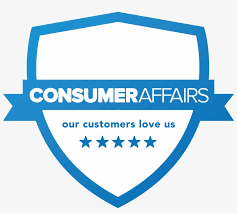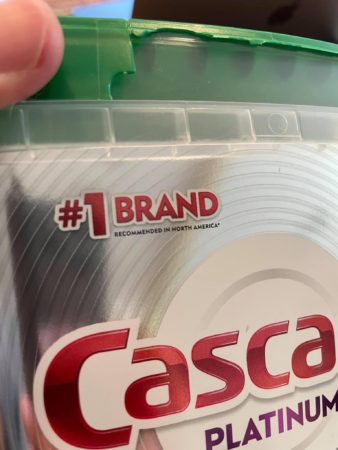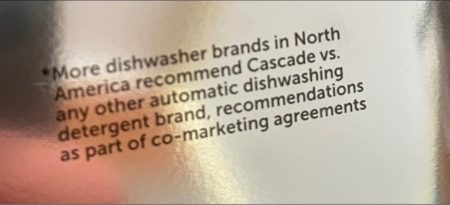Just because a company claiming to be working on consumers’ behalf makes an endorsement, it doesn’t mean you can take that recommendation to the bank.
There are a host of companies that earn their money by recommending companies that pay them for their endorsements. Usually these companies disclose that they have some kind of partnership with who they endorse, but not all of them show it prominently.
Companies then turn around and display the “endorsement” on their internet sites or products as proof of their good standing.
This growing trend requires consumers to read beyond the headline of an endorsement and to make thorough Google checks before turning over their credit cards.
Even Consumer Reports has a program that permits companies to display its endorsement for a fee. But, unlike most endorsement company, it thoroughly tests products, pays for the products, and doesn’t accept advertising.

Other well-known companies like Consumer Affairs and MarketWatch, get paid to endorse companies. They claim that they thoroughly vet the companies that are allowed to display their logos, buy many have thousands of valid complaints on the internet, are being sued for false advertising, or have warnings from the Better Business Bureau.
Consumeraffairs.com is one of the major players. It regularly sends out email blasts alerting consumers about legitimate consumer issues. Within those emails are recommendations to purchase services and products from hundreds of companies that pay for the endorsements.
The endorsement business is not limited to companies that provide services. They also include consumer products.
For instance, Cascade on its box says it is the #1 Brand Recommended In North America. But if you look at the small print on the back, you will see that the endorsement is based simply on Cascade having unspecified marketing agreements with dishwasher manufacturers.


Paid endorsements can also be found in thousands of news and review sites – many paid for by Amazon. The advertising can come from the name of a product that is hot-linked directly to that product on Amazon or through a generic product name that is also hot-linked to an Amazon product. Owners of these sites get paid whenever someone clicks on a hot-link.
Better Business Bureau Not Totally Trustworthy

The Better Business Bureau makes its money from clients who pay big bucks to be “accredited,” which allows them to post the BBB accredited seal on their websites.
The fact that the company might have thousands of valid complaints posted on BBB is immaterial. They just simply need to show that they are making an effort to resolve the issues.
Because of these factors, using the BBB is much harder for consumers to make wise decisions about which companies provide good value and good service.
Despite its shortcomings, my first check of a business is usually the BBB site. Once knowing that a business has paid to be accredited, I discount its letter grade. In many cases, the BBB notes pending government actions against companies – something that most other review sites don’t.
What is usually important are the number of complaints against a business, what the complaints allege, and how the business responds to the complaints.
The BBB is a lot more valuable when it comes to non-accredited businesses as its letter grading is more reliable.
Can’t Even Trust MarketWatch On Its Reviews
Even the highly respectable Dow Jones company’s MarketWatch site has gotten into reviewing businesses. It discloses it gets paid to play and says its reviews have nothing to do with its newsroom operation. While some of the businesses it promotes have high ratings from the BBB, others have lower ratings and many complaints.
On its site, MarketWatch recommends five car warranty companies that are the “most reputable.”
“We’ve sifted through the industry for you, comparing dozens of providers to find the five most reputable extended car warranty companies available, all of which also ranked highly in our best extended car warranty review.”
One of the five is CarShield, which the BBB does not consider one of the most reputable. It is not accredited.
The BBB included the following warning about the company along with an F rating and 3,000 plus complaints:
BBB advises consumers to use caution if considering doing business with CarShield, a vehicle service contract company. BBB received a pattern of consumer complaints alleging the company:
- Employed misleading sales and advertising practices, including TV advertisements stating consumers will not be responsible for expensive repairs and can take their vehicle to any repair facility which consumers found was not to be true
- Failed to cover repairs
- Failed to adequately explain mileage and time component before coverage begins
- Did not cancel their policies and provide refunds
- Delayed taking and processing claims leaving customers without their vehicles
- Provided poor customer service
MarketWatch’s top pick is Endurance, which received its highest score of 9.5.
Again, BBB was not enthusiastic about this business, which was rated by its Illinois chapter – where the company’s headquarters is located. Endurance is not an accredited business, has more than 1,000 complaints and has a C+ rating.
Since May 2019, the BBB serving Chicago and Northern Illinois has requested on multiple instances for Endurance Warranty Services, LLC to modify, or discontinue their promotional mailers being distributed nationwide. The businesses mailers contained aggressive and confusing language, that often intimidated consumers. In addition, the mailers were being distributed in envelopes resembling Federal Tax Documents.
To be fair, three other companies MarketWatch recommended, did receive high marks from the BBB: CarChex, Protect My Car and autopom!
Consumer Affairs Examples Of Misleading Endorsements
Consumer Affairs pretends to be a consumer website. While it does regularly provide valid and important consumer information on its email blasts, its main business is selling endorsements to its hundreds of partners.
Some of the endorsements are for companies that have a reputation for treating consumers properly, they are also for companies that have terrible consumer records and even face class action lawsuits for false advertising. Its site does made clear who are its “authorized partners.”
For instance, Consumer Affairs promotes Noom, a diet company which is a defendant in a $100 million lawsuit accusing it of multiple counts of false advertising. Noom is an authorized partner.
On its internet site, Consumer Affairs makes no mention of Noom being sued, nor the specific allegations the company is accused of.
On an another site, where Consumer Affairs ranks the diet plans, the only negative comment it has is that Noom does not have round-the-clock dieticians.
However, the lawsuit, which has been approved by a federal judge as a class action, alleges the customers do not have ANY access to dieticians, instead they get automated messages.
Consumer Affairs top pick for home warranty companies is American Home Shield, which it also labels as an “authorized partner.”
“American Home Shield is our top home warranty provider pick because it has excellent reviews,” it says.
The BBB site has less than stellar reviews.
Of 8,300 reviews, AHS received an average rating of 2.5 stars out of 5. It has had more than 21,000 complaints against it during the past three years, but since it pays to be accredited, the BBB gave it a B rating.
For auto warranties, it includes another partner, CarShield, and says it has more than 8,000 reviews with an average of more than four out of five stars.
BBB, as noted above, has warning to consumers about the company and gives it an F rating.
U.S News & World Reports Also Plays The Game

While its not totally clear how U.S. News & World Reports decides who can purchase its badge to show the company’s endorsement, on its website for “marketing opportunities,” it says “Purchase a U.S. News Badge.”
It also discloses on another site that the company “may make a commission when users on our site click a link to purchase or get more information about a product” it highly recommends.
“However, we provide these tools for the convenience of our users and they in no way affect our editorial independence.”
Its selling of endorsement badges and the promotion of companies that are frequent subjects of consumer complaints raises questions about how thoroughly it investigates colleges and hospitals for its famous ratings.
For instance U.S. News permits its badge to be used by Choice Home Warranty, one of the largest home appliance warranty companies. On its internet site, it says it has determined that Choice is tied for the third spot in its rankings.
In a recent email solicitation I received from Choice Home Warranty, it says that the firm has been “recognized as best home warranty two years in a row.” Next to that claim are two badges from U.S. News 360 reviews saying that its not only the best claims service but also the best home warranty company.
A check on the Better Business Bureau site shows that Choice Home Warranty has paid to be an Accredited business. It has a high B rating despite having more than 8,000 complaints during the last three years. Of 1,336 customer reviews, the average rating was one out of five stars.
More importantly, the BBB notes that in October 2019 the Arizona Attorney General filed a fraud complaint claiming that:
The AG was seeking up to $10,000 for each violation of Arizona Consumer Fraud Act. That lawsuit is ongoing.
Choice, on its website says it had a four out of five star reviews from customers and displays endorsement badges from Inc. 5000 and BestCompany.com.
Its website prominently shows endorsement badges from Inc. 5000 and BestCompany.com.
CNBC’s Slight Of Hand
CNBC runs advertising without identifying it as such.
For instance in a recent weekend email update from CNBC, there is a “story” about the “16 Highly Unnecessary Things Adults Waste A Fortune On.”
Clicking on the link to read the full article, takes you to yourpennysaver which is labeled as sponsored content and includes one recommendation for buying solar panels. Filling out the form gets you solar panel salesmen.
CNN and the Washington Post run ads from pennysaver, but label them as such.


